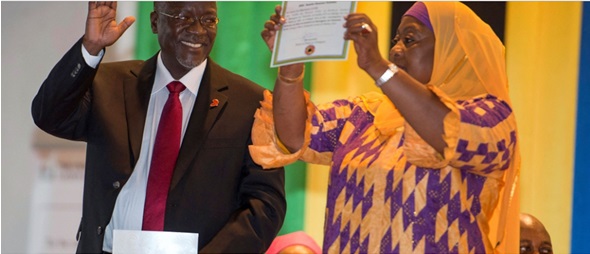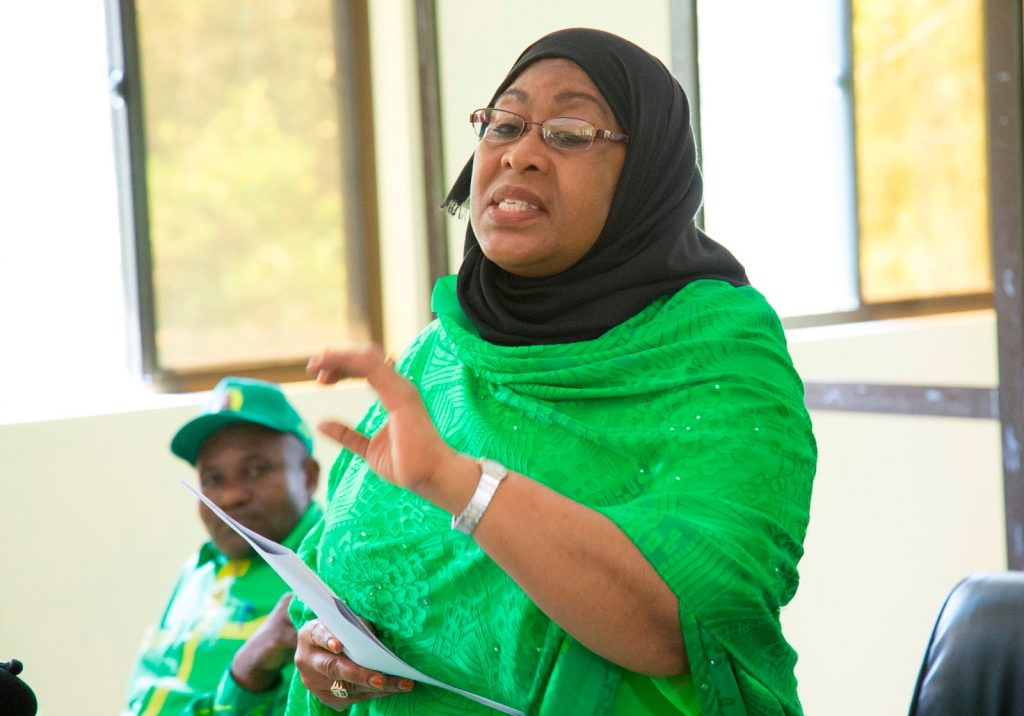…Will the Death of President Magufuli Bring Real Change to Tanzania?

Written By Judd Devermont and Marrielle Harris for CSIS in Washington DC, March 18, 2021.
Tanzanian vice president Samia Suluhu delivered the news to the Tanzanian people on Wednesday at 11 p.m. East African Time: “President Magufuli has died of heart failure,” she solemnly reported on live television. The announcement came after more than a week of speculation into John Magufuli’s whereabouts, including claims that he was in a coma due to Covid-19 and medevaced to Kenya and then India, which government officials repeatedly denied. At least one individual was arrested for posting reports of Magufuli’s ill health.
Magufuli’s passing raises urgent questions about whether Tanzania will change direction or stay the course. During his presidency, Magufuli steered Tanzania toward authoritarianism by implementing a nationalist economic agenda characterized by stifled regional and international trade and a blow to foreign direct investment (FDI). Magufuli went to great lengths to quiet dissent—outlawing statistics that challenged official government data, attacking the political opposition, stifling civil society, and muzzling the media. He spread misinformation; at the start of the pandemic, Magufuli, a Covid-19 skeptic, told Tanzanians the virus was “satanic” and “[could not] live in the body of Christ.”
His administration stopped releasing Covid-19 data at the end of April 2020, creating rifts between Tanzania and regional governments instituting strict Covid-19 measures. And in October 2020, Magufuli claimed re-election victory in a highly contested poll marred by voter intimidation and sustained suppression of the political opposition.
Q1: Who is Magufuli’s successor?
A1: According to the Tanzanian constitution, Vice President Samia Suluhu will be [has been] sworn in as Magufuli’s replacement—making her the second female president in East Africa and the first in Tanzania. She will serve out the remainder of Magufulu’s five-year term until new elections in 2025. A Zanzibari Muslim and longtime member of the ruling Chama Cha Mapinduzi (CCM) party, Suluhu has served as vice president of Tanzania since 2015, when Magufuli took office. She rose in political prominence under former president Jakaya Kikwete as minister of state at the vice president’s Office for Union Affairs, and before that as minister for tourism, trade, and investment and minister for youth employment, women, and children development in the Zanzibari government.

Q2: Will Suluhu break from Magufuli’s policies?
A2: Suluhu is unlikely to rock the boat—at least at first. Like in transitions in Nigeria (2010), Ethiopia (2012), Malawi (2012), and Zambia (2014), Suluhu may choose to play the role of unifier in a deeply polarized country. The new president will probably refrain from wholesale repudiation of Magufuli’s policies, including those that stifle civil society and the media. These tactics, while prominent under the former president, have been employed by CCM to retain control since independence in 1961.
Suluhu’s first moves will feature appeals for unity among Tanzanians in her public rhetoric.
According to an anonymous insider, Suluhu is perturbed by the growing division in Tanzanian society and was shaken by violence surrounding the October 2020 elections. There have also been questions around changes in the national Covid-19 response. Tanzania’s approach to date was spearheaded by Magufuli without broad political consensus, and there could be a rapid shift on issues such as testing and vaccine procurement if Suluhu changes course.
She has regularly appeared in public without a facemask over the past year, though this might have been in response to direct pressure from Magufuli.
There will also be questions about Suluhu’s decisions to pause, scrap, or continue major development projects, including a $3.5 billion crude oil pipeline led by Total SA, a liquified natural gas plant, a hydropower plant, and a standard gauge railway, for which Magufuli secured $1.3 billion of Chinese loans in January 2021.
Q3: How will Suluhu manage CCM’s internal power struggles?

A3: Suluhu, like previous accidental presidents in the region, almost certainly will seek to consolidate her grip over the party and government over time. A Tanzanian activist who wishes to remain anonymous described Suluhu as “ambitious and intentional.”
She will try to thread the needle between a fractured CCM, navigating animosity and distrust between a club of devout Magufuli followers and the ruling party’s more traditional members—the “old guard”—some of whom grew increasingly wary of Magufuli’s authoritarian policies during his rule. Suluhu is believed to fall more into the second camp than the first, and she is likely to hold more sympathy than her predecessor for the urban, liberal Tanzanians who favor free press and free trade.
Any efforts by Suluhu to reverse Magufuli’s policies—particularly those related to trade and development deals—will be met by opposition from Magufuli’s closest allies. It will serve as a test of her mettle and political acumen if she decides to challenge and sideline those who profited under the previous regime. While Suluhu may not have the inclination or wherewithal to fully reverse CCM’s antidemocratic instincts, she has an opportunity to soften some of Magufuli’s more extreme policies[….]
Q4: How can the international community be helpful?
A4: The international community has an opportunity to reset relations with Tanzania and demonstrate its support during this time of transition. Regional governments should focus on trade, health, and security issues, while the United States should extend an olive branch and test whether a new partnership is possible.
- Regional Reengagement. In the wake of Magufuli’s passing, Tanzania’s neighbors have an opportunity to resolve simmering trade disputes, smooth over clashes related to Covid-19 containment strategies, and deepen security cooperation. Over the past five years, Magufuli clamped down on regional trade and butted heads with regional leaders over Covid-19 mitigation strategies. East African leaders should press for increased economic integration, the ratification of the Africa Continental Free Trade Area (AfCFTA) agreement, and the relaxation of bans on regional goods and services. Mozambican president Filipe Nyusi may also ask Suluhu’s government for more support against extremist actors on the Tanzania-Mozambique border. Regional powers will need to approach the new president—who will look to them to boost her international legitimacy—with patience, prioritizing relations over photo ops.
- Renewed U.S. Outreach. The United States, which has had a rocky relationship with Magufuli over the pandemic, women’s rights, political oppression, and flawed elections, should make the first move to at least symbolically restore its partnership with the Tanzanian government. The State Department released a boilerplate statement overnight expressing its condolences and reiterating support for advocacy on human rights and Covid-19 response, but there is more to be done. Washington could, for example, set up a high-level virtual meeting—such as a Zoom “visit” from Secretary Blinken—to demonstrate its support for Tanzanian institutions and rule of law. U.S. officials may want to acknowledge the disagreements during the past five years and identify a path toward closer ties with the Tanzanian government and society.
Judd Devermont is the director of the Africa Program at the Center for Strategic and International Studies (CSIS) in Washington, D.C. Marielle Harris is a research associate with the CSIS Africa Program.
Critical Questions is produced by the Center for Strategic and International Studies (CSIS), a private, tax-exempt institution focusing on international public policy issues. Its research is nonpartisan and nonproprietary. CSIS does not take specific policy positions. Accordingly, all views, positions, and conclusions expressed in this publication should be understood to be solely those of the author(s). © 2021 by the Center for Strategic and International Studies. All rights reserved. SOURCE: Center for Strategic International Studies (CSIS).

